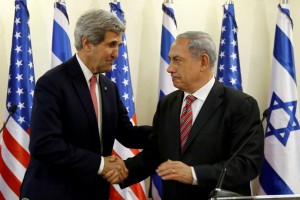 While the focus of US attention is on how to craft an agreement defining Iran’s nuclear program, the broader issue of Iran’s hostility toward Israel has long been at the center of the US-Iran divide.
While the focus of US attention is on how to craft an agreement defining Iran’s nuclear program, the broader issue of Iran’s hostility toward Israel has long been at the center of the US-Iran divide.
No real reconciliation between the US and Iran is likely while Iran is seen as an implacable foe of the most important American ally in the Middle East — a country derided in Iran since the 1979 Islamic Revolution as the “lesser Satan” to America’s “Great Satan.”
Since the election of President Hassan Rouhani last summer, however, Rouhani and his foreign minister, Mohammad Javad Zarif, have changed the Islamic Republic’s discourse in a way that is making members of Israel’s military and intelligence establishment take notice, if not yet acknowledged publicly by Israeli Prime Minister Benjamin Netanyahu and his supporters in the US Congress.
The shifting rhetoric may reflect Iranian understanding of a need to soften congressional antagonism toward Tehran, as well as important changes in the Middle Eastern landscape that are increasing the potential threat to Israel from al-Qaeda-linked Sunni Muslim terrorists who are mutual enemies of Israel, Western countries and Iran. Such groups are now gaining strength all around Israel, in particular in Syria, Lebanon and Egypt’s Sinai desert, and pose a threat to European and US interests.
Read more here
The Iran Project is not responsible for the content of quoted articles.

 QR code
QR code